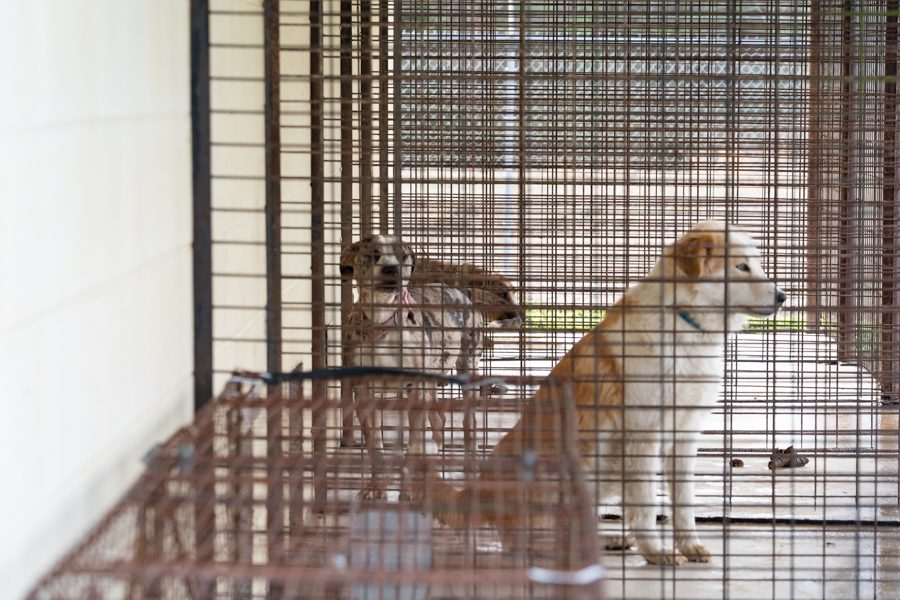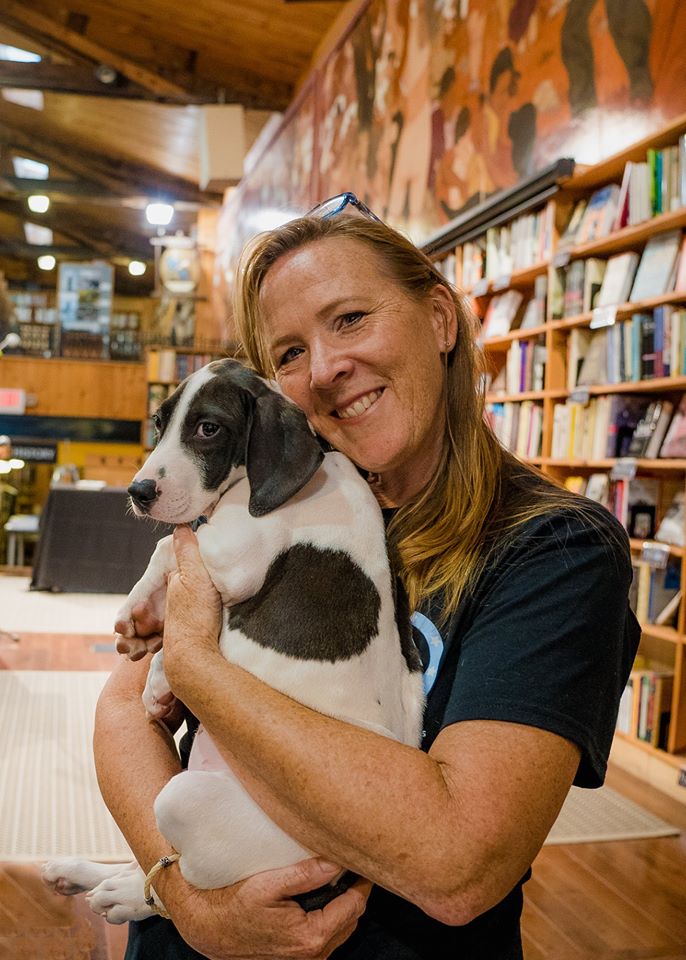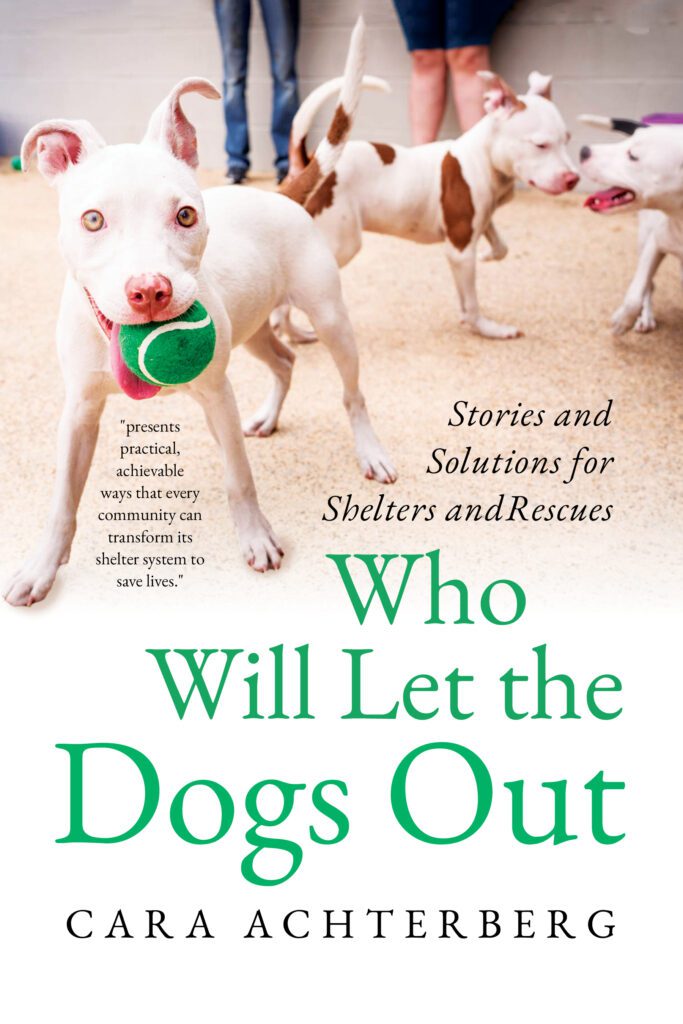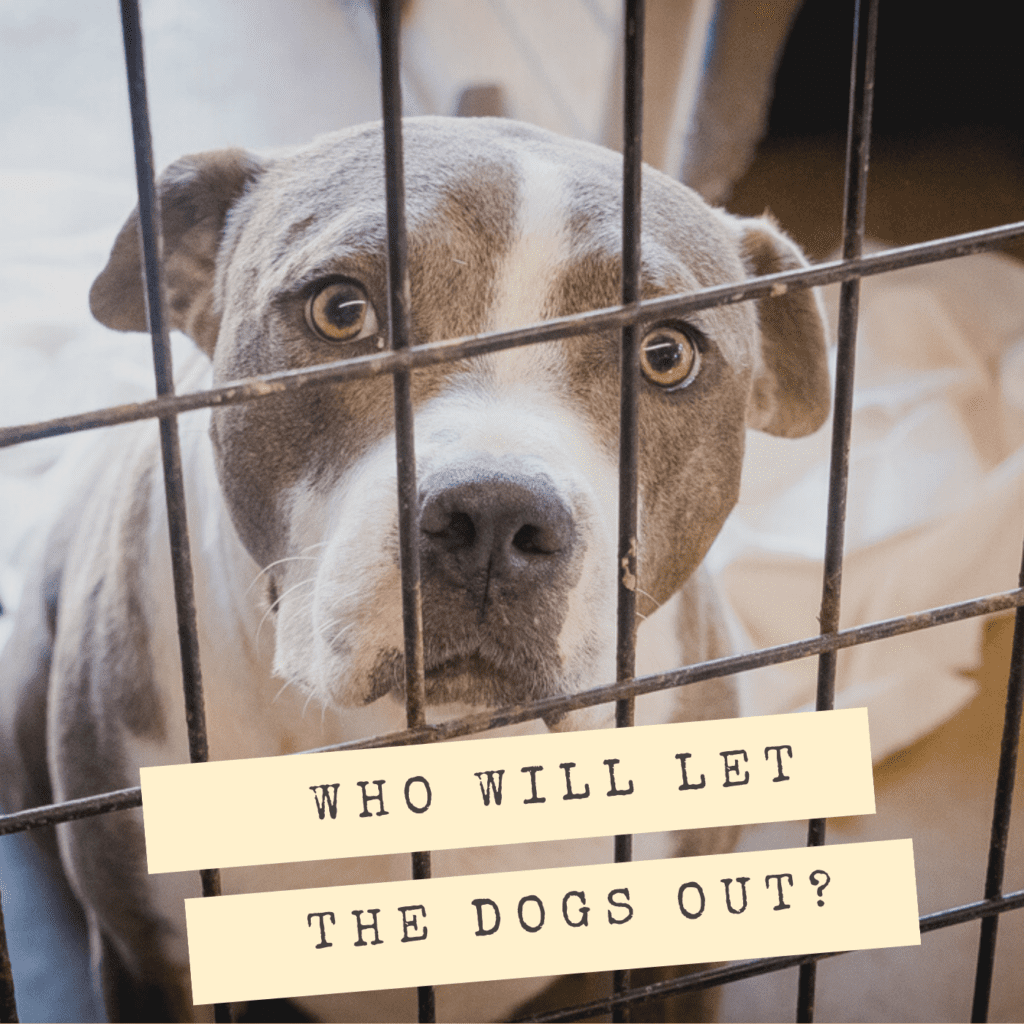It’s been six years since I last visited this animal shelter in Tennessee, the Huntingdon Dog Pound. That was the day I found my darling pup, Miss Fanny Wiggles. She was emaciated and covered in poop.





Now, she is a healthy, beautiful dog who can catch any frisbee, loves the agility course, and stole my husband’s heart.



The Reality Inside This Rural Animal Shelter
Today, when we visited the animal shelter, the dogs were not emaciated, and the kennels had been freshly sprayed out by Timmy, the dog catcher who was expecting us.
Other than the wet, relatively unpooped-on cement, everything else was exactly the same.
The wire kennels were still completely rusted with sharp broken edges and corners and holes. One of the dogs had bloody wounds on both sides of his head from putting his head through a hole in his kennel fence.





The Biggest Problems at the Huntingdon Dog Pound
- Cement block building with harsh conditions
- Reliant on handful of volunteers from outside the county
- No public access to the pound
- No HVAC
Volunteers Provide the Only Care/Chance of Getting Out of the Animal Shelter
We were at the pound with Brittany and Tiffany, The Rescue Sisters, who travel nearly two hours each way from Tiffany’s home to help the dogs. They walk the dogs, give them preventatives, take pictures and videos, plus try to ‘dog-test’ them so that they can be networked to rescues. Before they leave, they give them dental treats because they all seem to have terrible teeth.
There are eleven kennels and the day we visited in February 2025, there were seven dogs. Two were recent arrivals; one had been there over three months, and Tiffany was taking another home with her to clean her up and get her to a foster home the next day. The others were being networked, and with the help of CASA Transport or Rural Animal Rescue Effort – RARE, they will likely get out.



But for too many dogs who land in this animal shelter, they don’t get a happy ending. The isolation and harsh conditions can be too much, and they break down, becoming unadoptable, and have to be euthanized.
The cement block building is a traditional dog pound built in 1999. Timmy, the dog catcher, has worked there for 14 years. He likes his job. He works 20 hours a week, fitting in picking up strays and feeding the dogs around his full time job at a local factory and other part-time job mowing grass.
He told me that until Trisha (with RARE), Brittnie (with CASA), and the Rescue Sisters started coming out, his regular routine was to hold the dogs for two weeks and then take them to the vet to be put down. He is only required to hold them for three days.
There is no public access to the pound. The gate is locked and only Timmy, who works for the city of Huntingdon, and Van, the dog catcher for Carroll County, have access.
When any of the women want to come help the dogs or pull them out for rescue, they must call Timmy to let them in and lock up after them. The building is on a deserted, sandy, wooded property surrounded by a tall chain link fence with barbed wire at the top. I remember writing in my post when I was here in 2019 that it would make a good set for a horror movie. I still think that.
Conditions Inside the Shelter
There is no HVAC in the block building, but there are two powerful space heaters set up. It was a beautiful day, but I remember from my previous visit, how unbearable it is in the summer heat. The bugs are bad too, since when the kennels are sprayed out, everything runs into the small drainage pond beside the building.





Honestly, it’s a bleak place. The women have recently provided raised Karunda beds, but there are no toys, no treats, no walks. The dogs are all alone except when Timmy feeds them after work in the afternoon or if Brittney, Tiffany, Brittnie, or Trisha drive out, which happens at least once a month.
As I looked at the kennel where Fanny had been, I couldn’t help superimposing her image on it. And I shuddered to think the dog who is so precious to Nick and I ever suffered here. If not for these women, none of whom are paid or live in this county, all of the dogs would perish.
Timmy likes his job and said the best part is when the dogs find homes. He seems like a good guy. He’s lived here all of his life and doesn’t seem to see anything wrong with the situation at the pound. This is how it’s always been. At home, he has three Yorkies. He likes dogs. And the dogs seemed to like him, too.



Why the Shelter Needs Change
I’m gonna guess that none of the citizens of Huntingdon looking for their lost dogs have ever actually come to the pound. Timmy can probably tell by their description whether he has their dog and can return it to them.
I think this because I have to believe that anyone who loves their dog would be horrified to see them living in this place. And anyone who even likes dogs would be upset that their municipality thinks that this situation is okay for dogs to live in. I have to believe that as a citizen of Huntingdon City or Carroll County, they would demand change. They wouldn’t be happy their tax dollars fund a place like this.
As we drove out, I noticed a professional building and a medical center, a few businesses, some nice homes, lots of open space, and some industrial buildings. It was not a desolate, impoverished place that can afford nothing more.
Do they know that just down the street is a cement bunker that houses dogs in the barest of conditions? That they cut their faces trying to escape their enclosures or fight with the dogs beside them through the fence? That they are fed once a day, a ration of the cheapest food available since the budget barely covers it? That dogs suffer in the oppressive heat being eaten by mosquitoes and flies? Or that they live in their own filth when it is too cold to spray out the kennels because the water will freeze?
That if not for these dedicated women who drive two hours one way, they would remain infested with fleas, unvaccinated for anything, overrun with worms, and likely contract heartworms living beside a drainage pond if they managed to dodge the drive to the vet’s office to be destroyed there instead?
What will it take to bring change to this animal shelter?

The History of the Huntingdon Animal Shelter aka The Huntingdon Pound’
Several years ago, the Nashville Humane Association and then the Humane World for Animals (formerly the HSUS) came to the pound, declared the situation inhumane, removed the dogs, demanded an explanation, and reported what was happening to the state vet.
And yet, nothing changed.
As we drove to Memphis, I pondered these things in my heart. I wondered if there was anything I could write, anything I could do, to save dogs like my precious pup, Fanny, from suffering here.
And, honestly? I don’t know.
Awareness brings change. That’s the drumbeat of the work we do. But is that possible in Huntingdon, Tennessee?
How to Support the Huntingdon Dog Pound
If you’d like to support the women who care for these dogs, consider shopping the Amazon wishlist of the Rescue Sisters: https://www.amazon.com/hz/wishlist/ls/PJNCLWF7JULL
Or donating to CASA Transport or RARE Rescue who are the only organizations getting these dogs out alive.
Or, if you live in Huntingdon or Carroll County, learn more about how your tax dollars are used to fund the pound, and consider advocating for a more humane Animal Shelter.

Cara
About Who Will Let The Dogs Out
If you want to learn more, be sure to subscribe to our email list to get the latest stories and solutions delivered to your inbox. And help us spread the word by sharing this post with others. Visit our website to learn more.
You can also help raise awareness by following/commenting/sharing our content on Facebook, Instagram, YouTube, and Tik Tok.

Who Will Let the Dogs Out: Stories and Solutions for Shelters and Rescues was published in January of 2025. It is filled with stories and ideas to help everyone be part of the solution. You can buy a hardback or paperback copy for yourself and/or buy a copy for a shelter or rescue through our website. It is also available on Amazon in paperback and ebook. We are looking for opportunities to share a presentation of the ideas in the book and facilitate conversations about how we can work together to find solutions for our shelters. If you have a dog-hearted group that would like to connect, contact Cara@wwldo.org.
To see our Emmy-nominated, award-winning short documentary, Amber’s Halfway Home, click here.

Did you know we have a podcast? I’m working at getting regular episodes up, including the audio version of the new book (narrated with additional info), and interviews with shelter heroes we meet. Find the podcast on Spotify and other podcast services.
For more information on any of our projects, to talk about rescue in your neck of the woods, or partner with us, please email cara@WWLDO.org.
And for links to everything WWLDO, including volunteer application, wishlists, and donation options, check out our Linktree.



Yvonne Leach
I try not to get depressed reading this post. It’s sad though. I keep putting my hope in what you say: it starts with awareness. And you are doing that.
Cara Achterberg
That’s the goal – awareness, without it no change will ever come. Sometimes it’s hard to see/hear about the situation, but we have to look and hear because otherwise, we can’t bring change. Thanks for reading, Yvonne!
Beverly B. Johnson
Shame on this county and its officials. It’s 2025. They can do better. They must do better by these innocent animals. Sad state of mind for the citizens of this area.
Cara Achterberg
I think there are plenty of people who care in Huntingdon and Carroll County, the problem is they aren’t the ones in charge. But its their voices and their efforts that will ultimately change the situation, which is why we keep visiting and writing and supporting the work of the few that are trying to bring that change. Thanks for reading!
Mary
I purchased a couple of items on the Amazon list link in your blog post. Thank you for keeping your readers aware of both the successes and the continuing problems with animal sheltering.
Cara Achterberg
Thank you so much! They will appreciate it. We work to be fair and to show a balance of what’s working and how we can make things better. Thanks for reading!